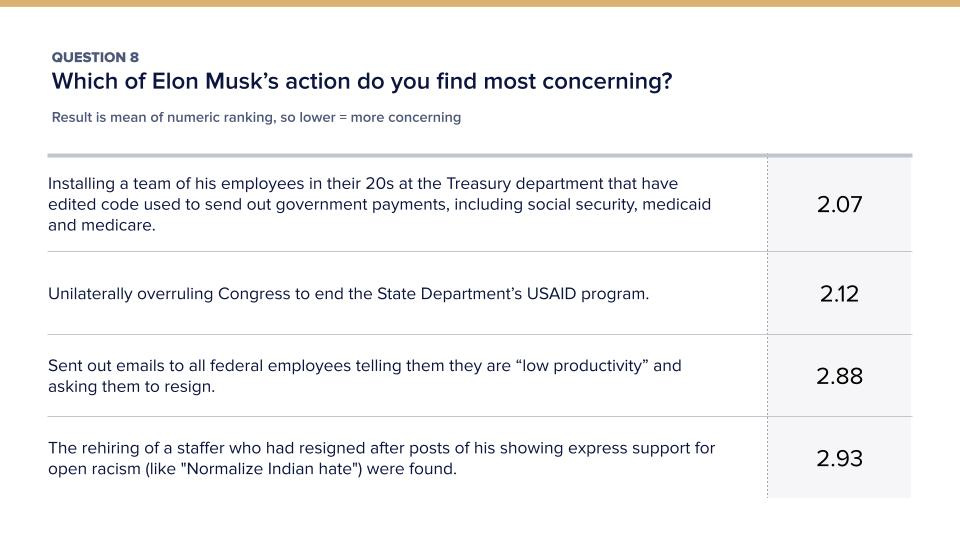POLL RESULTS: Options for Democratic Offense
Preliminary evidence suggests Musk, inequality-affordability crisis, and right wing use of division for austerity are increasingly unpopular—even among Trump voters
As part of our mission to understand, persuade, and mobilize voters across the entirety of our multigenerational, multiethnic, and ideologically diverse coalition, we’re always looking for new research tools and systems—and if they’re cost effective enough for testing out draft questions and wording, even better.
As an experiment, we recently ran a quick poll with a few baseline favorability questions on topics like Elon Musk’s actions, why the country feels so off-course, and our overall theory of the case for Democrats’ path forward.
The consensus among establishment DC Dems is that the path to victory is a combination of waiting for Trump to collapse and moderating further (somehow) on “cultural” issues like DEI, immigration, and trans issues. Our view is that this strategy was exactly the play the Harris campaign ran: it failed completely and 19 million Biden 2020 voters stayed home in 2024. We are planning to research these “skippers” more deeply, but our strategic assertions are that Democrats need a stronger story and more clear positioning on why the country and economy feel so broken to so many Americans, and that they can not cede the territory of change to the right. Stronger positional clarity is particularly crucial since Dems and the left are operating from a multi-decade, many-billions-of-dollars media and persuasion deficit. Their story has to and can be more compelling than the worn, tired and dry focus on kitchen table issues.
This poll was the next step in our ongoing work to better understand the issues informing our hypothesis. We found strong initial support, with voters agreeing with statements tying inequality to the affordability crisis and right wing uses of fear and division roughly 2 to 1. The survey was conducted on February 12, 2025, via Pollfish’s self-serve platform, and it surveyed 600 US registered voters with a margin of error of +/- 5pts. We’re also publishing a slide deck with the results, the question wording, and a few selected crosstabs.
The overview question results were similar to other recent polls: Trump job approval was at net -1, Democratic party favorability was at net -4, Republican party favorability was at net -7, and 2024 vote choice was Harris +3, indicating a likely somewhat Democratic-leaning sample. (The base-level Pollfish survey we have access to only allows for weighting to census-based gender and age range, which we opted not to use.) The 2026 generic ballot question—“think ahead to the 2026 midterm election. Would you be more likely to vote for the Democratic candidate or the Republican candidate for US Congress?”—was +5 Dem.
We also found more evidence of Democratic Party dissatisfaction, as seen in other recent surveys. Dem Party favorability with Harris voters was a net of +62 (77% fav/15% unfav), while Rep party favorability with Trump voters was 15 points higher, net +77 (85% fav/8% unfav)
Support for a list of several actions taken by Elon Musk was net -9 (48% oppose, 39% support, with 37% completely opposed). Of the four actions listed the strongest opposition was to Musk installing part of his team at Treasury and editing code used to send out payments.
We asked two questions related to broader Democratic messaging challenges. In a forced-choice question, respondents overwhelmingly agreed (+28) that wealth hoarding by the 1% was more responsible for our country’s problems than DEI and wokeness. In future surveys, we will try split testing a different alternative explanation: that government or size of government is more responsible for our challenges.
We also found strong agreement with a statement that MAGA Republicans and a few billionaires are using fear to divide us, and including government workers as one of the outgroups targeted for blame. The result across all voters was net +27 (57% agree/30% disagree), and even 27% of Trump voters expressed agreement that Trump and MAGA are using division to hoard wealth. Harris voters agreed with a net of +77 (85% agree, 8% disagree).
And last, cryptocurrency continues to be somewhat of a niche topic that appeals to a minority of the electorate—but when forced to choose, 61% of all respondents (including a surprising 46% of Trump voters) expressed a high level of distrust in it, saying cryptocurrency was closer to “a complete scam” than an exciting new financial technology (39%).







